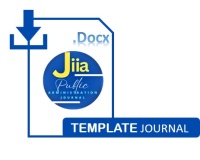ANALISIS EFEKTIFITAS IMPLEMENTASI KEBIJAKAN PEMERINTAH DALAM KONTEKS KETERLIBATAN PEMANGKU KEPENTINGAN (STAKEHOLDER ENGAGEMENT): STUDI KASUS PROGRAM REVALUASI BARANG MILIK NEGARA PADA KEMENTERIAN KEUANGAN
DOI:
https://doi.org/10.33592/jiia.v10i2.633Abstract
Policy implementation in the government programs and activities is often constrained by weak coordination of stakeholders. The State-Owned Property (SOP) Revaluation Program conducted by the Ministry of Finance in 2017 and 2018 runs slowly and takes a long time to validate the revaluation data. This study intends to uncover the causes of these constraints and how to increase stakeholder engagement in the SOP Revaluation Program. The research method used is qualitative research. The research will conduct literature studies based on various references, documents, and reliable sources at the Directorate General State Asset Management of the Ministry of Finance. This research shows that the policy implementation in the SOP Revaluation Program has not been effective. This shows the low-level of stakeholder engagement caused by the low capability of the human resources at the units of the Ministries/Institutions, the low quality of the SOP management by the units, and the low commitment of the units to achieve the objectives of the program. For this reason, stakeholder mapping needs to be done, as well as choosing a different approach for different stakeholders.
References
Amir, M., Aruan, Nakkok., dan Rifki, M.S., (2018), Layanan Badan Penyelenggara Jaminan Sosial (BPJS) di Rumah Sakit Milik Pemerintah Provinsi Jawa Timur, Matra Pembaruan: Jurnal Inovasi Kebijakan.
Anderson, James E. (2011), Public Policy Making: An Introduction, Wadsworth Cengage Learning, Boston, United State of America.
Bal, Menoka, dkk (2013), Stakeholder Engagement: Achieving Sustainability in the Construction Sector, MDPI Journal.
Bourne, Lynda (2015), Series on Effective Stakeholder Engagement: Stakeholder Theory, PM World Journal.
Debrilianawati, Dessy., Saleh, Choirul., Hadi, Minto., (2011), Peran dan Koordinasi Antar Instansi Dalam Pemberdayaan Warga Binaan Pemasyarakatan di Lembaga Pemasyarakatan: Studi tentang Program Kemandirian Pelatihan Kerja Pengelolaan Ikan Air Tawar di Lembaga Pemasyarakatan Kelas II B Kota Pasuruan, Jurnal Administrasi Publik (JAP) Vol 1, Nomor 2 Halaman 174-180.
Department of Health Australian Government (2017), Stakeholder Engagement Framework, Australia.
Lane, Jan-Erik, (1995), The Public Sector: Concepts, Models and Approaches, Third Edition, SAGE Publication, London.
Lubis, S.B. Hari, Huseini, Martani, (2009), Pengantar Teori Organisasi: Suatu Pendekatan Makro, Departemen Ilmu Administrasi Fakultas Ilmu Sosial dan Ilmu Politik Universitas Indonesia.
Prabandary, Noviana Wahyu, (2016), Koordinasi Antar Institusi Dalam Pengelolaan Benda Cagar Budaya Candi Borobudur.
Nazarudin, (2016), Pengaruh Koordinasi dan Pengawasan Terhadap Efektivitas Organisasi di Lingkungan Pemerintahan Kabupaten Cianjur, Universitas Pasundan Bandung.
Sari, Intan Permata, dan Wulandari, Ratna Dwi, (2015), Penilaian Koordinasi Antarunit Kerja di Rumah sakit Berdasarka High Perfomance Work Practices, Jurnal Administrasi Kesehatan Indonesia Volume 3 Nomor 2 Juli-Desember 2015.
Sinclair, Marie-Louise (2017), Developing a Model for Effective Stakeholder Engagement, Sinclair Consulting.
Smith, N. Craig dkk (2011), What’s at Stake? Stakeholder Engagement Strategy as the Key to Sustainable Growth, Faculty and Research Working Paper, INSEAD.
Susanto, A.B. (2014), Manajemen Stratejik Komprehensif: Untuk Mahasiswa dan Praktisi, Penerbit Erlangga, Jakarta.
Sylviani, Sylviani dan Yosefi, Elvida, (2015), Peran dan Koordinasi Para Pihak Dalam Pengelolaan KPH, e-Journal Penelitian Sosial dan Ekonomi Kehutanan, Kementerian Lingkunga Hidup dan Kehutanan.
Theodoulou, Stella Z., Kofinis, Chris, (2004), The Art of the Game: Understanding American Public Policy Making, Wadsworth/Thomson Learning, Belmont, USA.
Undang-undang Nomor 1 Tahun 2004 tentang Perbendaharaan Negara.
Peraturan Pemerintah Nomor 27 Tahun 2014 tentang Pengelolaan Barang Milik Negara/Daerah.
Peraturan Presiden Republik Indonesia Nomor 75 Tahun 2017 tentang Penilaian Kembali Barang Milik Negara/Daerah.
Lapora Hasil Monitoring Penilaian Kembali Barang Milik Negara Ditjen Kekayaan Negara Tahun 2017.
www.kemenkeu.go.id
www.djkn.kemenkeu.go.id

















